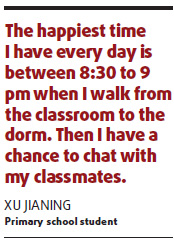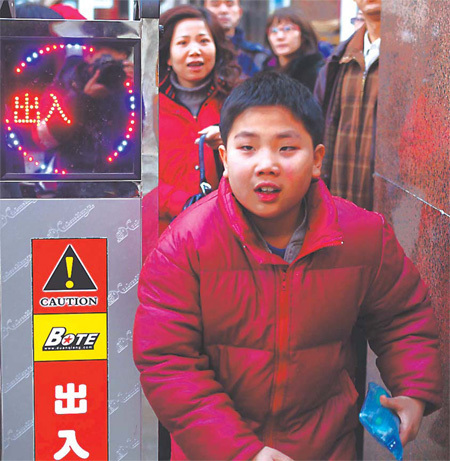Education
Fierce battle to get in school
By Wang Wei (China Daily)
Updated: 2009-12-29 10:27
 |
Large Medium Small |
|
|
Xu Jianing, a 12-year-old boarding primary school student, hasn't had a whole weekend off for almost three years. Her spare time has been crammed with all kinds of extra courses since she was 10.
Her busy schedule on weekends starts at 7 am every Saturday. She has to take two English courses, each lasting three hours, throughout the day. When she finishes class at 4 pm, she goes home to review what she learned.
The only difference on Sunday is that she studies other subjects - this time mathematics and Chinese language along with more English.
Her weekdays are no better.
The lights in her dorm go off at 9 pm, so she sometimes goes to the public bathroom to finish her homework, as it is the only place with the lights on throughout the night.
"I rarely have time to play at school," Xu said.

"The happiest time I have every day is between 8:30 to 9 pm when I walk from the classroom to the dorm. Then I have a chance to chat with my classmates."
She is only one of the 123,000 youngsters in Beijing diligently preparing for next year's middle school entrance examination, according to statistics from Chen Wei, a professor with Renmin University of China.
Most Chinese families hold the view that the only way their children will be successful is to have a certificate from a prestigious university. Going to a good middle school is an important step to achieving that goal.
Xu's parents expect her to enter Huiwen Middle School, one of the top schools in Chongwen district, so they put Xu into an instruction program run by the school itself.
"The school will favorably consider students from the program. Of course, their score is also important," said Zhou Jiemin, Xu's mother.
A congratulation letter to Liu Pengzhi, president of Affiliated Middle School of Renmin University (one of the best middle schools in Haidian district) from Ji Baocheng, president of Renmin University was posted online.
It showed that in 2009 about one in three - 259 out of 700 - students from the middle school went to Peking University, Tsinghua University and Renmin University of China, the nation's top three universities.
The best way to secure a place at a well-known university might be studying at a renowned middle school, but the competition is already fierce even at that age.
A parent surnamed Lou, whose child studies at the Affiliated Middle School of Renmin University told METRO that she heard from a director at the school that on average the number of students admitted by the school is around 700 annually.
However, she added that more than 5,000 students apply to enter.
Xu's mother Zhou said it took a great deal of time and effort to help her daughter get successful admission to a top Beijing middle school.
She takes turns with her husband on weekends to take Xu to various extra classes. Sometimes they even sit at back of the class to take notes for their daughter in case she didn't completely follow the instruction.
"Then we can explain it to her after the class," Zhou said.
Zhou said she also worked with her daughter to write an article for the national Chunlei Composition Contest because the prize is highly recognized by top middle schools in Beijing.
"I know it is not right," she said.
"But if the composition wins her a prize that may help her go into a top middle school, I have to do it."











